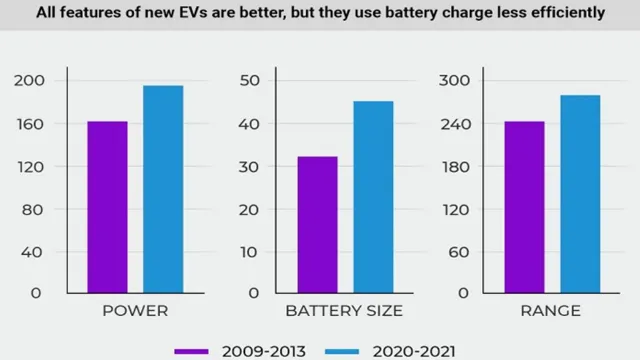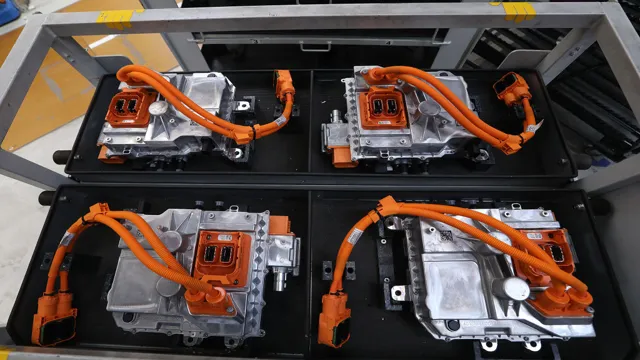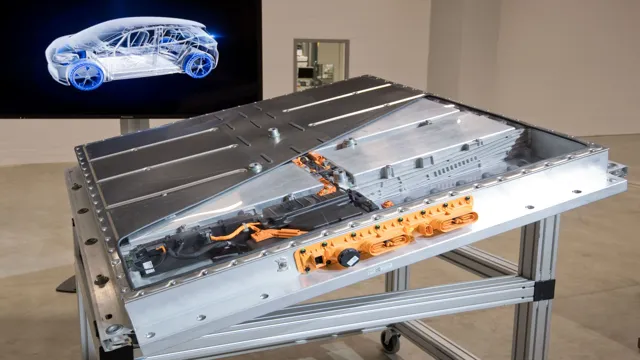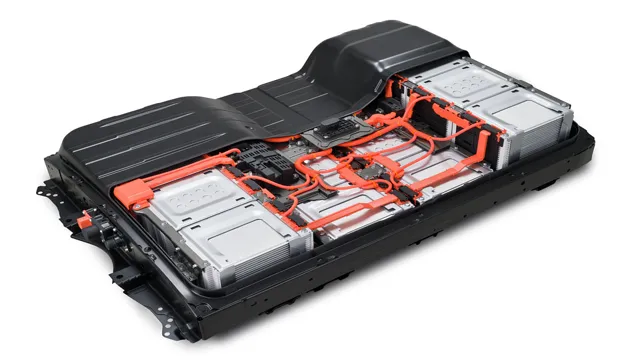The Shocking Truth About the Average Battery Capacity of Electric Cars: How to Choose the Perfect EV for Your Needs
Electric cars have become increasingly popular in recent years, with more people choosing them as a more sustainable mode of transportation. One of the most crucial components of electric cars is the battery. Batteries store and provide energy to power the car, making them essential to the vehicle’s overall performance.
But the question remains, how much energy can an electric car battery hold? On average, electric car batteries have a capacity of around 60-85 kilowatt-hours (kWh). To put this into perspective, a typical household might use around 30 kWh per day. This means that electric car batteries have the potential to store enough energy to power a home for a couple of days.
However, the battery capacity can vary depending on the make and model of the car. Some cars may have a smaller battery capacity, while others may have a higher capacity. The capacity can also depend on factors such as driving habits and weather conditions.
Despite the variations in capacity, it is essential to understand that electric car batteries are still relatively new technology and are continually being developed and improved. As technology advances, it is likely that battery capacity will increase, allowing for longer ranges and better performance. In conclusion, electric car batteries have an average capacity of around 60-85 kWh, but this can vary depending on the car’s make and model and other factors.
As technology continues to advance, battery capacity will likely increase, making electric cars an even more attractive option for those looking for a sustainable mode of transportation.
Understanding Electric Car Batteries
If you’re considering buying an electric car, one of the most important factors to consider is the battery capacity. On average, electric cars have a battery capacity of around 60-85 kilowatt hours (kWh), although some models may have larger or smaller batteries. This battery capacity will determine how far the car can travel on a single charge.
For example, a Tesla Model S with an 85 kWh battery can travel up to 265 miles on a single charge, while a Nissan Leaf with a 40 kWh battery has a range of around 150 miles. It’s important to note that factors such as driving style, weather conditions, and terrain can all impact the range of an electric car. As battery technology continues to improve, we can expect to see even higher battery capacities and longer ranges on future electric car models.
What are electric car batteries?
Electric car batteries are the heart and soul of all-electric cars. They are rechargeable storage batteries that provide the necessary power required to run the various components of the electric vehicle, including the electric motor. The most common type of battery used in electric cars is the lithium-ion battery, which is lighter, more efficient, and has a larger energy density than traditional lead-acid batteries.
Electric car batteries are typically made up of multiple battery cells that are connected in series and parallel arrangements to provide the necessary voltage and capacity. These batteries are designed to last for many years and require careful maintenance to ensure their longevity. With the continuous advancement in battery technology, electric cars are slowly becoming a feasible alternative to traditional fossil fuel-driven cars, paving the way for a more eco-friendly and sustainable future.

How do they work?
Electric car batteries are complex technological marvels that make electric vehicles possible. These batteries work by storing electric energy in a chemical form, which can then be used to power the car’s motor. The most commonly used electric car battery technology is the lithium-ion battery, which is highly efficient and has a long lifespan.
The battery consists of multiple cells, each with a positive and negative electrode separated by an electrolyte. During charging, lithium ions move from the positive electrode to the negative electrode, and during discharge, they move back. The ions flow through the electrolyte, allowing the battery to generate electrical energy.
The capacity of these batteries can vary depending on the number of cells they contain, with more cells resulting in higher ranges. Electric car batteries require careful management to prevent overcharging and overheating, as well as regular maintenance to ensure their longevity. Overall, electric car batteries are an essential component that is driving the move towards a more sustainable future.
Average Battery Capacity of Electric Cars
The average battery capacity of electric cars has been increasing steadily over the past few years as automakers strive to improve the driving range of these vehicles. As of 2021, the average battery capacity of an electric car is around 60 kWh, which is enough to provide a driving range of around 200-250 miles. However, some electric cars such as the Tesla Model S and the Lucid Air have significantly larger battery packs that offer a range of over 400 miles.
The battery size and range of an electric car depend on several factors such as the vehicle’s size, weight, and power requirements. Additionally, advancements in battery technology could lead to even larger and more efficient batteries in the future, making electric cars a more viable option for long-distance travel. Overall, the increasing battery capacity of electric cars is a promising development for the future of sustainable transportation.
Data on average battery capacity
When it comes to electric cars, one of the most important factors to consider is the battery capacity. This determines how far the car can travel on a single charge, and it’s a crucial aspect of EV performance. On average, electric cars have a battery capacity of around 60-100 kWh.
However, there are some models that have much larger batteries, such as the Tesla Model S and Model X, which have capacities of up to 100 kWh. It’s worth noting that battery capacity isn’t the only factor that affects range, as other factors such as driving style, weather, and road conditions can also impact how far an EV can go on a single charge. But generally speaking, a larger battery capacity is a good indicator of a longer range and better performance.
So if you’re in the market for an electric car, it’s worth considering the battery capacity as one of your top priorities.
How battery capacity affects range and performance
When it comes to electric cars, battery capacity plays a crucial role in determining the vehicle’s range and overall performance. On average, electric cars have a battery capacity of around 60 kWh, which can provide a driving range of approximately 200-250 miles per charge. However, this can vary greatly depending on the specific make and model of the vehicle.
For example, Tesla’s models boast much higher battery capacities, with some models reaching up to 100 kWh. This not only provides them with a significantly larger range but also allows for quicker acceleration and a smoother driving experience. On the other end of the spectrum, some more affordable electric cars may have a smaller battery capacity, resulting in a smaller driving range and potentially less impressive performance.
Ultimately, the battery capacity of an electric car is a key factor to consider when deciding which model to buy, as it can greatly impact the driver’s overall experience.
Comparing different electric car models
When it comes to comparing different electric car models, one of the most crucial factors to consider is the average battery capacity. This metric plays a significant role in determining the range of an electric vehicle and the time it takes to charge. The battery capacity is usually measured in kilowatt-hours (kWh) and can vary greatly among different models.
For instance, the average battery capacity of popular electric cars like the Tesla Model S ranges from 75 kWh to 100 kWh, while the Nissan Leaf has a smaller capacity of 40 kWh. A larger battery capacity generally means a longer range and a higher price tag, so it’s essential to consider your specific needs and budget before choosing a model. Ultimately, the average battery capacity is just one of several crucial factors to consider when comparing electric cars, including price, performance, features, and charging infrastructure.
By weighing all of these factors, you can make an informed decision and find the electric car that best suits your lifestyle.
Factors that Influence Battery Capacity
The average battery capacity of electric cars varies depending on a range of factors. One of the most critical factors that influence battery capacity is the type of battery used in the car. Lithium-ion batteries are the most common type used, and they have a higher energy density than other types.
However, the capacity of lithium-ion batteries is affected by temperature, which can decrease their range. Another factor that affects battery capacity is the vehicle’s weight and size, with larger vehicles requiring larger batteries to achieve the same range as smaller ones. The weather and driving conditions can also impact battery capacity, as fast driving, rapid acceleration, and frequent stops can drain the battery faster.
Additionally, factors such as the age of the battery and the charging habits can also affect the overall battery capacity and lifespan. Therefore, it’s essential to consider all these factors when evaluating the average battery capacity of electric cars.
Type of battery
When it comes to batteries, their capacity is determined by a variety of factors, including the type of battery. Battery capacity is the amount of charge a battery can hold, and it can vary greatly depending on the materials used in the battery’s construction. For example, lithium-ion batteries have a higher energy density compared to lead-acid batteries, which means they can store more energy in a smaller space.
Additionally, the temperature can also affect battery capacity, as extreme heat or cold can cause the battery to lose its charge faster. Other factors that can influence battery capacity include the age of the battery, its usage patterns, and how often it is charged and discharged. In short, the type of battery is just one of many factors to consider when looking for a battery with optimal capacity for a given application.
Battery age and wear
The age and wear of batteries can significantly impact their capacity to hold a charge. There are several factors that contribute to battery age and wear, such as how often they are charged and how they are used. For instance, exposure to high temperatures can accelerate the degradation of a battery, and frequent charging can also cause wear on the battery over time.
Additionally, the type of battery can also affect its lifespan and overall performance. Lithium-ion batteries are known for their efficiency and durability, whereas lead-acid batteries tend to require more maintenance and have a shorter lifespan. It’s important to keep these factors in mind when considering the longevity of a battery and to take proper care to ensure maximum performance.
Temperature and climate
Temperature and climate can have a significant impact on the capacity of a battery. The performance of a battery depends on the chemical reactions that take place within, and these reactions are often temperature-dependent. In general, batteries work best under moderate temperatures, around 20-25°C.
When temperatures increase or decrease beyond the normal operating range, battery performance can be affected greatly. High temperatures can cause batteries to degrade and lose their capacity much faster, while extremely low temperatures can result in reduced discharge capacity. Furthermore, humidity can also affect a battery’s performance.
High humidity can cause corrosion of the battery’s metal parts, leading to a premature failure of the battery. In conclusion, it’s essential to consider the temperature and climate conditions of your location when selecting or using batteries to ensure that they perform optimally for an extended period.
Increasing Battery Capacity
The average battery capacity of electric cars has been increasing steadily over the years as technological advancements continue to emerge. In fact, the latest electric vehicles on the market have batteries with a capacity of up to 100 kWh, compared to the initial electric cars that had an average of 20 kWh. This increase in battery capacity has led to increased driving range, which has been a major concern for electric car drivers.
It also means that the charging time has reduced significantly, making electric cars more convenient and practical for daily use. As the demand for electric vehicles continues to rise, car manufacturers are investing more in research and development to improve battery technologies and increase the driving range even further. All these efforts are aimed at making electric cars more accessible and appealing to the masses, and it seems to be working.
As we head into the future, we can expect to see even more impressive electric car models with even more impressive battery capacities, making it a truly exciting time for the automobile industry.
Advancements in battery technology
As our devices become more advanced and our reliance on technology grows, the need for batteries with higher capacities becomes increasingly important. Thankfully, advancements in battery technology have led to significant improvements in battery capacity over the years. Through the use of new materials and designs, batteries are now able to store more energy per unit of volume and weight.
This means that we can now enjoy longer battery life in our smartphones, laptops, and even electric vehicles. With the rise of renewable energy sources such as solar and wind power, higher capacity batteries are also essential for effective energy storage solutions. As a result, researchers and manufacturers in the battery industry are continually working towards the development of batteries with even greater storage capacities.
The increased capacity of batteries means that we can stay connected, work, and play for longer periods without worrying about running out of power.
Range extenders and dual-source power systems
If you’re looking to increase the battery capacity of your electric vehicle, there are a few options available. One of the most popular methods is to use range extenders, which use a small gasoline or diesel-powered generator to charge the battery as you drive. This can significantly increase the driving range of your EV, and is a great option for those who frequently take long trips.
Another option is to use a dual-source power system, which combines the power of a traditional battery with a hydrogen fuel cell or other energy storage system. This can provide even more power and range, although it can be more expensive and complex to install. Ultimately, the best option for increasing your EV battery capacity will depend on your individual needs and budget.
But with so many innovative new technologies available, there’s never been a better time to switch to an electric vehicle.
Conclusion
Just like with any relationship, it’s not about the size of the battery, but how you use it. Sure, the average battery capacity of electric cars may not be as large as we’d like it to be, but with advancements in technology and smarter driving habits, we can make the most out of what we have. Plus, who needs a big battery when you can just stop at a charging station and recharge your electric car’s batteries AND your own batteries with a cup of coffee or a snack? It’s all about efficiency and making the most out of every charge.
So don’t let the average battery capacity of electric cars discourage you – there’s plenty of fun and functional driving to be had!”
FAQs
What is the average battery capacity of electric cars currently on the market?
The average battery capacity of electric cars currently on the market is around 60 kWh, but this can vary greatly depending on the specific make and model.
How does the average battery capacity of electric cars compare to the range they can achieve?
The range of an electric car is not solely determined by its battery capacity, but also by factors such as driving style, temperature, and speed. However, in general, a larger battery capacity will allow for a longer range.
Are there any electric cars with significantly higher or lower than average battery capacities?
Yes, there are electric cars with both higher and lower than average battery capacities. Some high-capacity examples include the Tesla Model S with up to 100 kWh and the Audi e-tron with up to 95 kWh. Some lower-capacity examples include the BMW i3 with 42 kWh and the Nissan Leaf with 40 kWh.
How is the average battery capacity of electric cars expected to change in the coming years?
As battery technology improves, the average battery capacity of electric cars is expected to increase. Some upcoming electric cars, such as the Lucid Air and the Rivian R1T, are expected to have battery capacities of up to 100 kWh or more.





